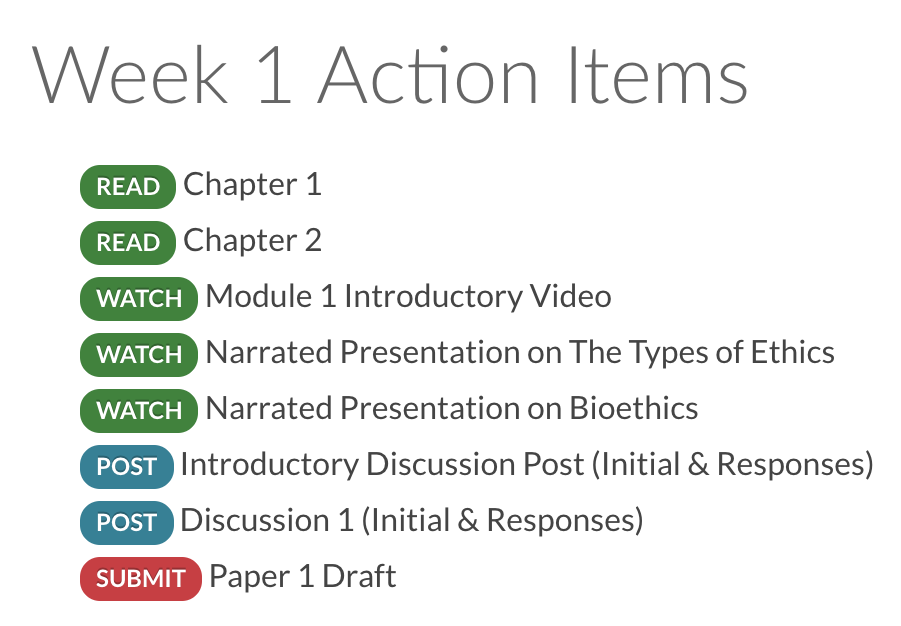In the 100 percent online University of Wisconsin Master of Science in Applied Biotechnology degree program, students acquire the skills and knowledge that prepare them for jobs in the rapidly growing biotechnology industry. The ABT 705: Ethics, Safety, and Regulatory Environments in Biotechnology course teaches students the communication and critical thinking skills necessary for a career in the field.
Enrolling in a master’s degree program is a big decision, especially if you are working full-time and have other commitments. You may be wondering what a typical course in the online program looks like, which can come with its own set of questions such as:
- How are lectures presented?
- What assignments will I work on?
- How do I interact with others in the course?
We’ll answer these questions and more as part of our course inside look at ABT 705: Ethics, Safety, and Regulatory Environments in Biotechnology.
What will I learn in the course?
ABT 705: Ethics, Safety, and Regulatory Environments in Biotechnology covers a wide range of ethical and safety concerns pertaining to the development, production, funding, and application of biotechnology. The award-winning course examines risk assessment in regulatory environments and analyzes the impact biotechnology has on socioeconomic factors.
Students will also discuss controversial topics within the industry, like the debate over genetically modified organisms (GMOs) and whether or not to use animals in scientific research. The course contains information relevant to your career advancement and is valuable for all students, regardless of which specialization track you pursue in the program.
By the end of the course, you will be able to:
- Critically assess workplace and research situations that may lead to ethical conflicts of interest and demonstrate appropriate responses
- Identify regulatory agencies and recommendation bodies that inform and/or enforce areas of ethical oversight in both the U.S. and abroad
- Obtain and interpret primary documentation from regulatory bodies
- Analyze and assess the costs and benefits of different regulatory frameworks
- Communicate regulatory information to others in a professional capacity
RELATED: Wisconsin: Outpacing Employment Growth in Biotechnology
Get Program Guide
Learn more about our 100% online degree and certificate programs.
What will the lectures be like?
There are a total of five units spread across 15 weeks in the fall and spring semesters, or at an accelerated pace of 11 weeks in the summer. Rather than having three 50-minute lectures each week, the course takes advantage of the online learning environment, giving you the flexibility to complete coursework on your own schedule. In addition to narrated and oral presentations, the instructor uses a lightboard and screen captures to walk you through demonstrations and supplement the weekly readings.
What types of assignments will I complete?
You will be assigned readings from the textbook and primary sources like governing documents and protocols. The material allows you to research and prepare for projects throughout the semester. Most units include online discussions and papers with peer review, while later modules feature a group project, oral presentation, and final exam.
The course calendar makes it easy to plan ahead and keep track of assignment due dates. Each week also comes with a list of action items showing what to watch, read, and submit.

What else will I do in the course?
You will learn the practical impacts of workplace safety by interviewing an industry expert about the types of projects they’re working on. The instructor will be available to help you find someone to interview, meaning students needn’t worry about coming into the course with industry contacts.
Another notable project is the series of “Oxford-style” debates, where different sides argue for or against a sharply framed motion. Students are assigned to one of three groups and must discuss hot topics in the biotechnology field. Two of the groups will post written or video responses to defend or provide a rebuttal for their argument, while the third group decides which argument was more convincing.

Who is the instructor?
Kiel Nikolakakis, Ph.D., is a chemistry instructor at UW-Green Bay. Dr. Nikolakakis believes developing an understanding of ethics is important in the STEM fields and biotechnology sector as we see the products from these sectors entering the market. Having studied bioethics and regulations during his undergraduate career, he received both his B.S. in biochemistry and Ph.D. in chemistry from the University of California, Santa Barbara.
RELATED: How Bioethics Impacts Biotechnology Practices and Discoveries
Do students in the course interact?
Yes. The course is designed to create a sense of community. Students connect through peer review, group projects, discussions, and a class Wiki page. Discussions are held in Canvas, the program’s online learning management system.
How much coursework will I do in one week?
Students are expected to dedicate an average of nine to ten hours per week to complete assignments. However, the course is asynchronous, which allows you to fit lessons within your work and life schedule without having to be online at a certain time.
Will I receive support in the course?
Dr. Nikolakakis answers questions via email and during virtual office hours. You can also reach out to a Success Coach for guidance throughout the program. Another option is the virtual Student Resource Lounge, which allows you to collaborate, ask questions, and have general discussions with your classmates. Tech support is available to help you resolve any technical problems related to Canvas.
Want to learn more about ABT 705: Ethics, Safety, and Regulatory Environments in Biotechnology or the 100 percent online University of Wisconsin Master of Science in Applied Biotechnology? Check out the program curriculum page or contact an enrollment adviser with any questions about the program. For more information, call 608-262-2011 or email learn@uwex.wisconsin.edu.










